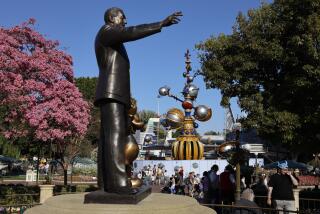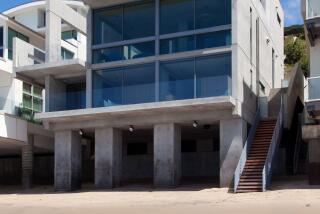Pico-Union Residents Hopeful About Court Order Against Gang
Weary residents and merchants in the gang-plagued Pico-Union neighborhood were cautiously optimistic Monday that something finally will be done about the 18th Street Gang, especially after authorities held a high-profile news conference to say they are going after the gang.
“I hope they do something,” Maria Meyer said as she walked with a friend to a store on Hoover Street, west of downtown. “I’m tired of the gangs. I wish they’d go someplace else.”
Her neighbor and friend, who accompanied her on a trip for milk and tortillas under the hot mid-morning sun, agreed, but she was not overly optimistic. “I hate them, too,” Ofelia Rivera said, “but will the gangs go away? I’m not sure. I want to see the police succeed, but I have to live there. They don’t. Will it do any good? Who knows?”
The comments by the two Pico-Union women came shortly after numerous public officials, led by Mayor Richard Riordan, vowed before a host of TV cameras and reporters to take aim at the 18th Street Gang--considered to be the largest and most dangerous in Los Angeles--and at least 50 of its members.
Dist. Atty. Gil Garcetti and Los Angeles City Atty. James Hahn told the gathering that their offices are seeking an injunction to restrict the gang’s activities in a square-mile area of Pico-Union. The proposed injunction would bar the gang members from engaging in a variety of otherwise legal activities, such as standing, sitting, walking, driving, gathering or appearing anywhere in public view together.
Garcetti went out of his way to say the proposed injunction would prohibit such activities involving two or more identified members of the 18th Street Gang. Other court injunctions have prohibited the gathering of three or more gang members.
The proposed Pico-Union injunction also seeks to ban them from:
* Knowingly remaining in the presence of anyone selling, possessing or using any controlled substance or related paraphernalia.
* Possessing or using a pager, beeper, cellular telephone or police scanner in any public place or any place open to public view.
* Blocking the free passage of any person or vehicle on any street, walkway, sidewalk, driveway or alleyway.
* Being present in an uninhabited or abandoned apartment, condominium or building.
In calling the court injunction the most ambitious ever sought against a gang in Southern California, Garcetti said it was a warning to 18th Street Gang members.
“This is only the beginning,” he said. “The injunction is a cooperative effort to end the 18th Street Gang’s reign of terror in Pico-Union, the heart of the gang’s illegal activities.”
Interim Los Angeles Police Chief Bayan Lewis said officers have served 36 of the 50 identified gang members with papers about the court action sought.
The complaint seeking the injunction is scheduled to be heard before Los Angeles Superior Court Judge William Beverly Aug. 29.
An estimated 200 18th Street members are said to be within the targeted area, bounded on the north by 9th Street, on the east by the Harbor Freeway, on the south by Washington Boulevard and the Santa Monica Freeway and on the west by Hoover Street.
Injunctions have become the most recent tool to restrict street gang activities in Los Angeles, with one last month aimed at an 18th Street clique in the Jefferson Park section of southwest Los Angeles.
The constitutionality of injunctions was upheld by the state Supreme Court in February.
Nevertheless, some questioned Monday’s announcement.
“The bottom line is that [court injunctions] don’t work,” said Elizabeth Schroeder, associate director of the ACLU of Southern California. She cited an ACLU study in the Blythe Street area of the San Fernando Valley that showed the court action didn’t decrease crime in the targeted area and that crime in surrounding areas went up.
“We still believe it is unconstitutional and the [state] Supreme Court is wrong,” Schroeder said.
Garcetti, reached later, said the ACLU’s conclusions are “simply not accurate. . . . Go into the community where they obtained an injunction and talk to the residents, talk to the police officers, talk to anyone in the area and ask them if things have gotten better.
“I venture to say that you’ll see smiles and great enthusiasm. Crime has virtually disappeared. The injunctions do work.”
Meanwhile, those in Pico-Union interviewed by The Times on Monday said they could care less about constitutionality. They want the 18th Street Gang stopped.
“I don’t care about the courts and things like that,” said one man as he sold paletas--frozen fruit bars--from a pushcart on Pico Boulevard. “I’m tired of them ordering me around, taking money from me. Is it right? Hell no. . . . Tell the police that.”
More to Read
Sign up for Essential California
The most important California stories and recommendations in your inbox every morning.
You may occasionally receive promotional content from the Los Angeles Times.










